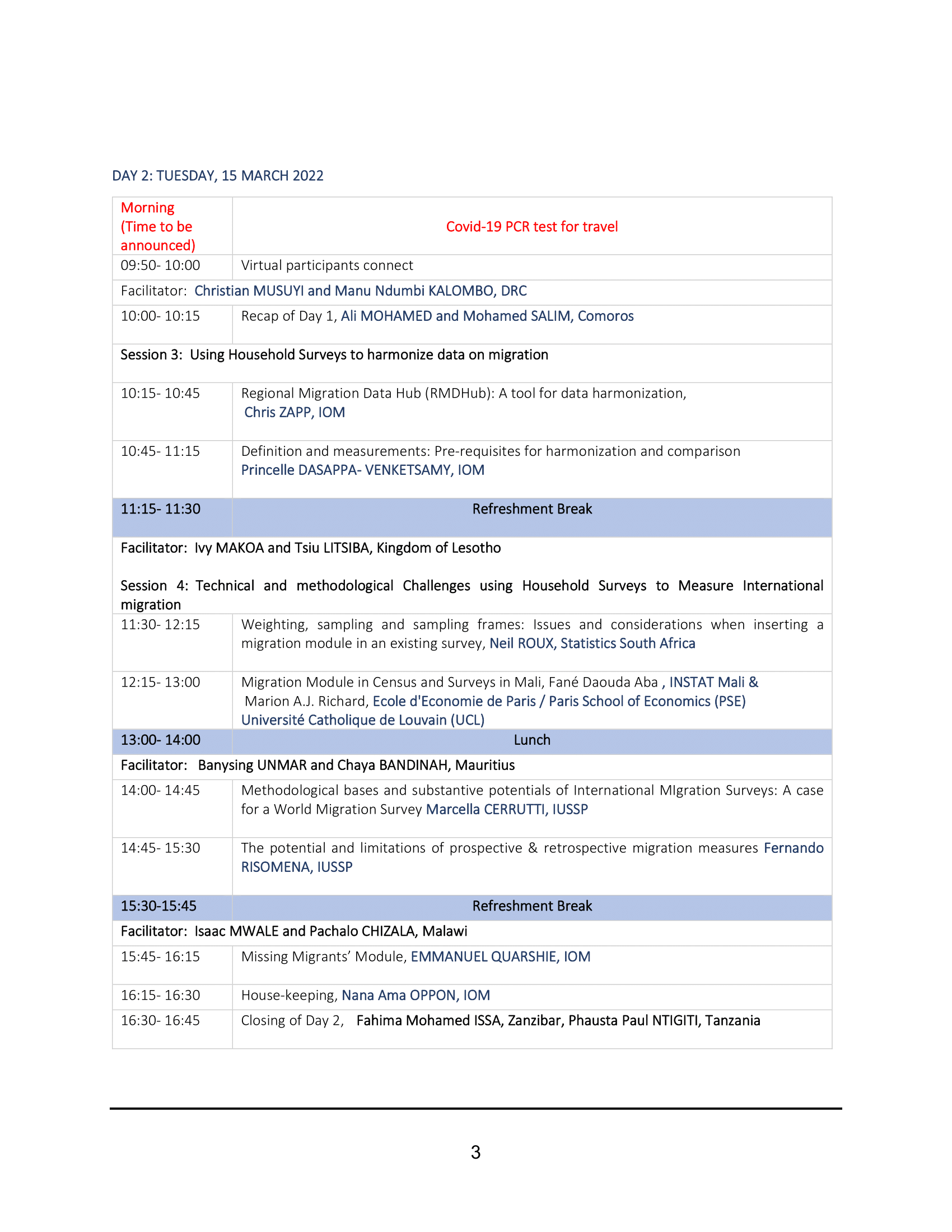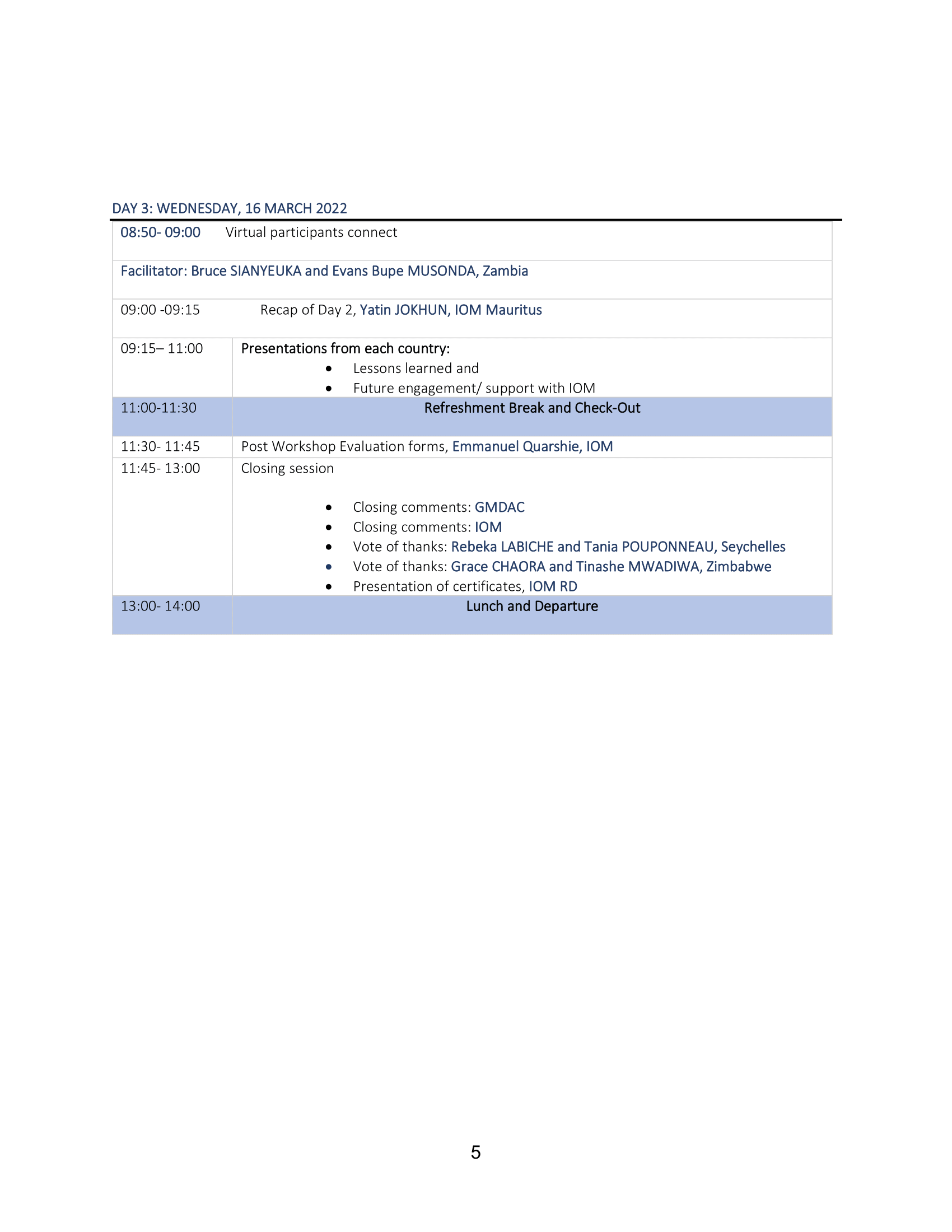-
Who We Are
WHO WE AREEstablished in September 2015, the International Organization for Migration’s Global Migration Data Analysis Centre was set up to respond to calls for better international migration data and analysis. Data are key to inform migration governance, improve programming and promote a better public understanding of migration.
About
About
IOM Global
IOM Global
-
Our Work
Our WorkData is key to inform migration governance, improve programming and promote a better public understanding of migration. GMDAC works toward this purpose through activities in knowledge management, data capacity-building and innovation, and data collection and analysis.
Areas of Work
Areas of Work
Projects
Projects
- Data and Resources
- Take Action
Workshop: Household surveys and international migration data - Using, improving and creating efficient migration data collection tools
-
Date
14 Mar 2022, 09:00am
-
Location
Hybrid (Pretoria, South Africa, GMT+2)
-
Organizer
This workshop is facilitated by IOM RO Southern Africa, with support from the Southern Africa Migration Management (SAMM) project, in partnership with IOM’s GMDAC.
The workshop "Household surveys and international migration data: Using, improving and creating efficient migration data collection tools" will be conducted in a hybrid manner and will cater for in-person and virtual participation. Participants will be invited from the government departments in the Southern Africa Member States. The invitation will be shared with a broader statistical audience who may want to participate virtually and benefit from the discussions. Zoom will be the platform used for virtual participation. The workshop will be translated into French.
Virtual participation is open to the public on the 1st day of the workshop (Monday, 14 March 2022). Please click this URL to join us with the Passcode: 0.EG!c
- Rationale
-
The International Organization for Migration (IOM), Regional Office in Pretoria, through its institutional mandate, is supporting the 16 Member States in the Southern Africa region, partners, and national and international organizations to effectively manage migration in order to maximize its positive impacts for all stakeholders concerned. Specifically, within the context of the Southern Africa Migration Management (SAMM) project “Improving the Migration Management in Southern Africa and Indian Ocean region” funded by the European Union, IOM has the specific objective to strengthen and ensure informed decision-making processes in the management of mixed migration and labour migration, through stronger mechanisms to generate timely and up-to-date data and statistics on migration. To better support governments and partners to strengthen the evidence base on migration, IOM, in partnership with the Member States and key stakeholders, established the Regional Migration Data Hub (RMDHub) for Southern Africa. The purpose of this is to generate information on migration through data collection, collation, and analysis of migration trends, to help advance migration policies at the national and regional levels.
The Center for Global Development (CDG) made four other recommendations:
- Better exploit existing administrative data sources, from population registers to registers of foreigners or foreign workers;
- Compile data from existing Labor Force Surveys in a harmonized database;
- Provide public access to micro data files on individuals and households, while protecting confidentiality; and
- Create and insert special modules on migration in existing household survey programs, including Labor Force Surveys.
Together with the objectives of the SAMM project, the RMDHub strategy, the key recommendations from MIDSA to strengthen migration data management and the strategic objectives of the SADC harmonization process in the region, as well are the recommendations from CDG, IOM is collaborating with IOMs Global Migration Data Analysis Centre (GMDAC) on a Workshop on household surveys and international migration data on using, improving and creating efficient migration data collection tools.
- Objective
-
The Workshop on household surveys and international migration data: using, improving and creating efficient migration data collection tools, has two objectives
Objective 1: Discuss with specialists the use of household surveys to collect migration data:
Inserting special modules on migration in existing households survey is an alternative to specialized migration survey, however the two methods share common methodological and technical challenges.
Objective 2: Explore methodological aspects with specialized migration surveys:
There are various parameters to be considered when thinking of adapting an existing survey to collect migration data such as the sample size of the survey, its focus, the length of the existing questionnaire etc, however it might be in the context of developing countries particularly, the only available way forward to collect more and/or better migration data.
The main challenge in implementing a migration survey is its cost and, to a lesser extent, the technical nature of the survey. Resource constraints can be a major obstacle to implementing a dedicated migration survey, particularly in developing countries. The addition of migration data modules to existing household surveys is much less costly. Surveys that could be considered for adaptation by adding questions on migration data are:
- Labour force surveys
- Demographic and Health Surveys (DHS)
- Living Standard Measurement Surveys
- Other large (e.g., multipurpose) surveys
- Partnership
-
This workshop is facilitated by IOM RO Southern Africa, with support from the Southern Africa Migration Management (SAMM) [1] project, in partnership with IOM’s GMDAC. In the scope of GMDAC’s collaboration with the IOM’s Regional Office in South Africa, GMDAC brings technical support in the form of this workshop for the inclusion of migration questions into existing household surveys. inclusion of migration questions into existing household surveys by addressing technical issues of sampling and the inclusion of migration- specific survey weights to all the interested member states.
[1] Southern Africa Migration Management (SAMM) project “Improving the Migration Management in Southern Africa and Indian Ocean region” funded by the European Union, IOM has the specific objective to strengthen and ensure informed decision-making processes in the management of mixed migration and labour migration, through stronger mechanisms to generate timely and up-to-date data and statistics on migration

- Target Audience
-
Technical specialists who work in the survey area, National Statistics Offices (NSOs), Department of Home Affairs, Department of Labour, employment specialists working on labour force, household/demographic and health survey specialists who oversee surveys methodology, methodologists, migration subject specialists.
- Modality
-
The workshop will be conducted in a hybrid manner and will cater for in-person and virtual participation. Participants will be invited from the government departments in the Southern Africa Member States. The invitation will be shared with a broader statistical audience who may want to participate virtually and benefit from the discussions. Zoom will be the platform used for virtual participation. The workshop will be translated into French and Portuguese.
- Agenda
-
Virtual participation is open to the public on the 1st day of the workshop (Monday, 14 March 2022). Please click this URL to join us with the Passcode: 0.EG!c




